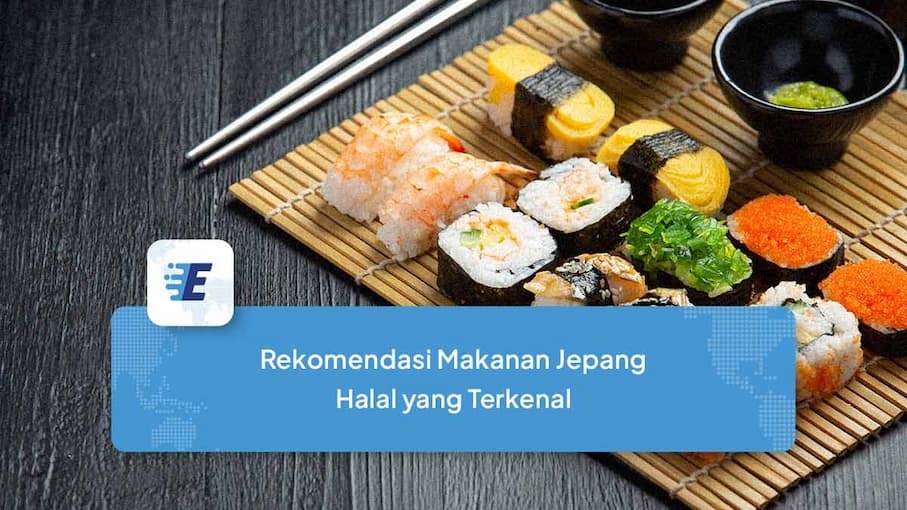Last updated on May 21st, 2025 at 01:21 pm
Traditional Japanese food has unique and appealing characteristics. Its allure extends beyond its origin in Japan to its popularity among Indonesia's predominantly Muslim population. Therefore, Indonesians generally prefer Japanese food that adheres to halal principles.
Before exploring the types of halal Japanese food, it's important to understand some of the unique aspects of Japanese cuisine. Here are some essential recommendations for halal food to know!
Are there many Halal foods in Japan?
List of contents
As the interest of Muslim tourists in Japan increases, there has been a significant rise in the availability of halal food. Some restaurants in major cities like Tokyo, Kyoto, Osaka, and other tourist destinations have started offering halal menu options to cater to the needs of Muslim travelers.
However, the number of restaurants serving halal food is still limited compared to non-halal ones in Japan. Nevertheless, efforts to provide more halal food choices are expanding alongside the growing demand from Muslim tourists.
In addition to restaurants offering halal food, there are also stores selling halal-certified food ingredients and products. This supports Muslim travelers who wish to cook their own meals while in Japan.
Tips for Choosing Halal Japanese Food
Here are some tips to distinguish between them:
- Research: You can conduct research online about Japanese restaurants that serve halal food.
- Check the Ingredients: Before ordering food, make sure you know what ingredients are used in the preparation of dishes. Some ingredients may not be halal, such as alcohol in sauces or other forbidden substances.
- Choose Fish or Vegetable Menus: Fish or vegetable-based menus are often safer in terms of halal status compared to menus using meat or ingredients with unclear halal status.
- Look for Halal Certification: Look for restaurants that have official halal certification from trusted authorities. This certification ensures that the food preparation process in the restaurant complies with halal standards.
- Ask the Restaurant Staff: If you have doubts about the halal status of a dish, don't hesitate to ask the restaurant staff directly. They can usually provide clear information about the ingredients and food preparation process.
Read Also: Studying in Japan: Preparation, Requirements, and Costs
Recommendations for Halal Japanese Food
Here are some recommendations for halal Japanese food you can try in Jakarta:
- Onigiri is a traditional Japanese food made of rice filled with various ingredients like avocado, tuna, or chicken. Onigiri is typically wrapped in nori, dried seaweed. It's a convenient and portable meal.
- Sushi is a Japanese dish consisting of rice wrapped in nori and filled with various ingredients such as fish, vegetables, or egg. Sushi is one of the most popular Japanese foods worldwide.
- Soba is Japanese buckwheat noodles usually served with dashi broth, soy sauce, or miso. Soba is a healthy and nutritious food choice.
- Tempura is Japanese food made of fish, vegetables, or seafood deep-fried in tempura batter. Tempura is crispy and savory.
- Sukiyaki is a Japanese dish of thinly sliced beef simmered in dashi broth. It's typically served with various vegetables like mushrooms, onions, and carrots. Sukiyaki is a warm and flavorful dish.
- Tendon is a Japanese dish of rice topped with tempura-fried vegetables, seafood, and meat. Tendon is delicious and nutritious.
- Shabu-shabu is a Japanese dish where thinly sliced beef is dipped in boiling dashi broth. It's served with various vegetables like mushrooms, onions, and carrots. Shabu-shabu is a healthy and refreshing meal.
- Gyoza is Japanese dumplings made from wheat flour dough and filled with ingredients like beef, vegetables, or seafood. Gyoza is typically fried or steamed and is crispy and flavorful.
- Okonomiyaki is a Japanese pancake made from wheat flour, eggs, and vegetables. It's filled with ingredients like beef, seafood, or cheese. Okonomiyaki is a delicious and filling dish.
- Takoyaki are fried balls made from wheat flour, eggs, and vegetables. Takoyaki is typically filled with octopus. It's a tasty and fun snack.
Besides the foods mentioned above, there are many other halal Japanese foods you can try. Here are some additional recommendations such as, ramen, udon, donburi, karaage, yakisoba, chahan, tamagoyaki and so on.
Read Also: 5 Principles of Japanese Work Culture You Must Know!
Restaurants in Japan with Halal Food
Japan is renowned for its delicious cuisine. However, for Muslim travelers, finding halal food can be challenging. Here are some restaurants in Japan that serve halal food:
Hannari
Hannari is a Japanese restaurant located in Tokyo. It offers a variety of halal Japanese dishes including sushi, sashimi, tempura, and bento.
Sushi Ichizyu
Sushi Ichizyu is a halal sushi restaurant located in Osaka. It serves a variety of halal sushi, sashimi, and donburi.
MALAYCHAN Satu
MALAYCHAN Satu is a Malaysian restaurant located in Tokyo. It offers a variety of halal Malaysian dishes including nasi lemak, laksa, and fried chicken.
ORIGAMI Asakusa Japanese Restaurant
ORIGAMI Asakusa is a Japanese restaurant located in Tokyo. It serves a variety of halal Japanese dishes including ramen, udon, and donburi.
Sushiken Asakusa
Sushiken Asakusa is a halal sushi restaurant located in Tokyo. It serves a variety of halal sushi, sashimi, and donburi.
Nagomi Halal Kobe Beef
Nagomi Halal Kobe Beef is a restaurant specializing in halal Kobe beef. It is located in Tokyo.
Ryotei Jyusouya
Ryotei Jyusouya is a traditional Japanese restaurant located in Kyoto. It serves a variety of traditional halal Japanese dishes including sushi, sashimi, and tempura.
Now sending money or buying Halal food in Japan is easier with Easylink! Enjoy the convenience of faster and safer money transfers to Japan. Click here to to send money to Japan now and enjoy your favorite Halal Japanese food!

